Critical Analysis of Paulo Freire's Pedagogy of the Oppressed
VerifiedAdded on 2023/06/07
|10
|3061
|158
Essay
AI Summary
This essay provides a critical review of Paulo Freire's influential book, 'Pedagogy of the Oppressed,' examining its core arguments and their implications. The essay begins with an overview of the book, discussing its historical context and significance in the field of pedagogy. It delves into Freire's key concepts, such as the relationship between the oppressor and the oppressed, the 'banking concept of education,' and the importance of critical consciousness for liberation. The review analyzes the book's strengths, including its focus on social justice and its call for a more dialogical and empowering educational system. It also considers the limitations, such as the need to understand the political, social, cultural and economic conditions of South American nations, as well as the broader implications of Freire's ideas. The essay concludes by assessing the enduring relevance of 'Pedagogy of the Oppressed' in contemporary educational and social contexts, highlighting its contribution to critical pedagogy and its continued influence on educators and activists worldwide.
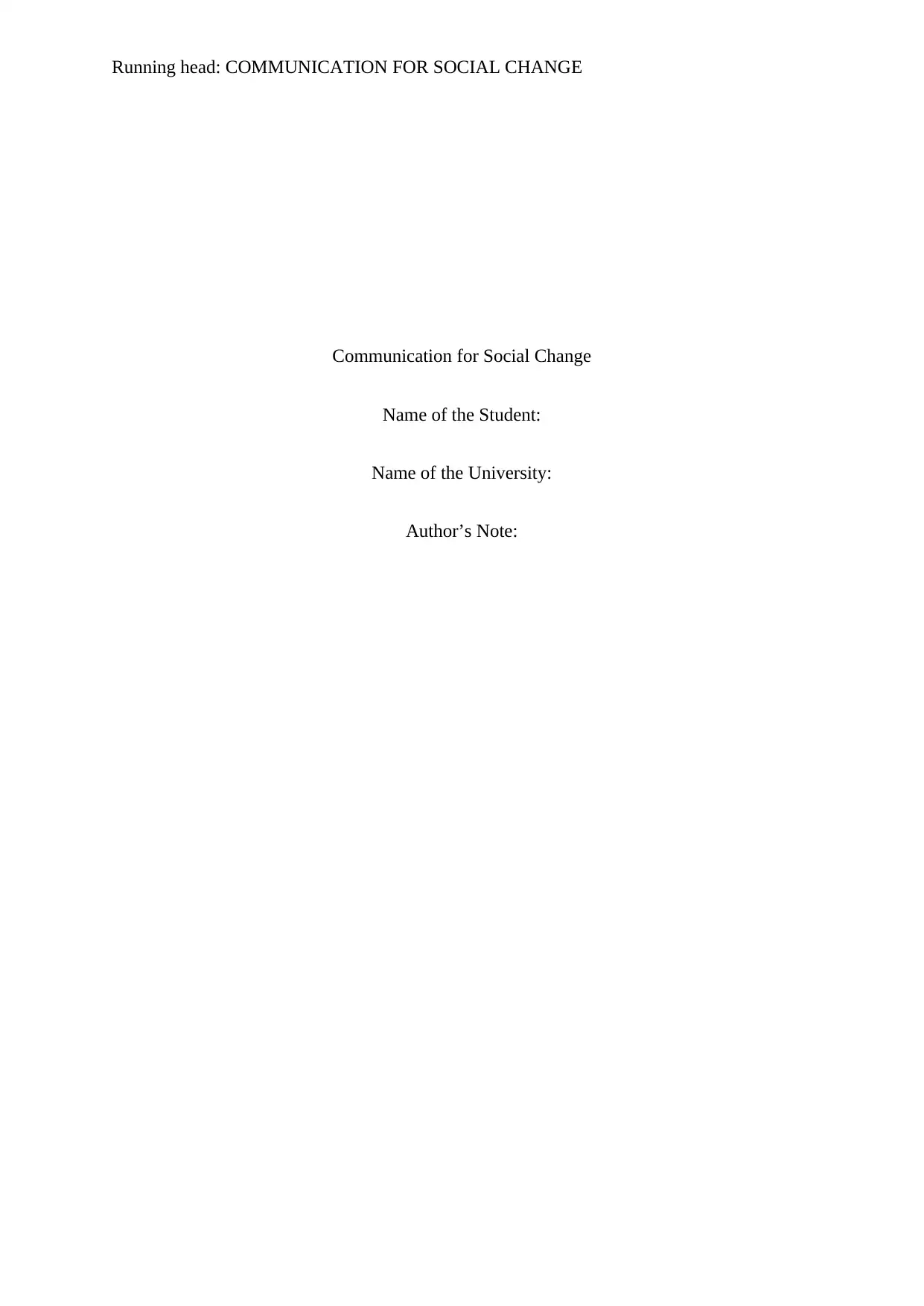
Running head: COMMUNICATION FOR SOCIAL CHANGE
Communication for Social Change
Name of the Student:
Name of the University:
Author’s Note:
Communication for Social Change
Name of the Student:
Name of the University:
Author’s Note:
Paraphrase This Document
Need a fresh take? Get an instant paraphrase of this document with our AI Paraphraser
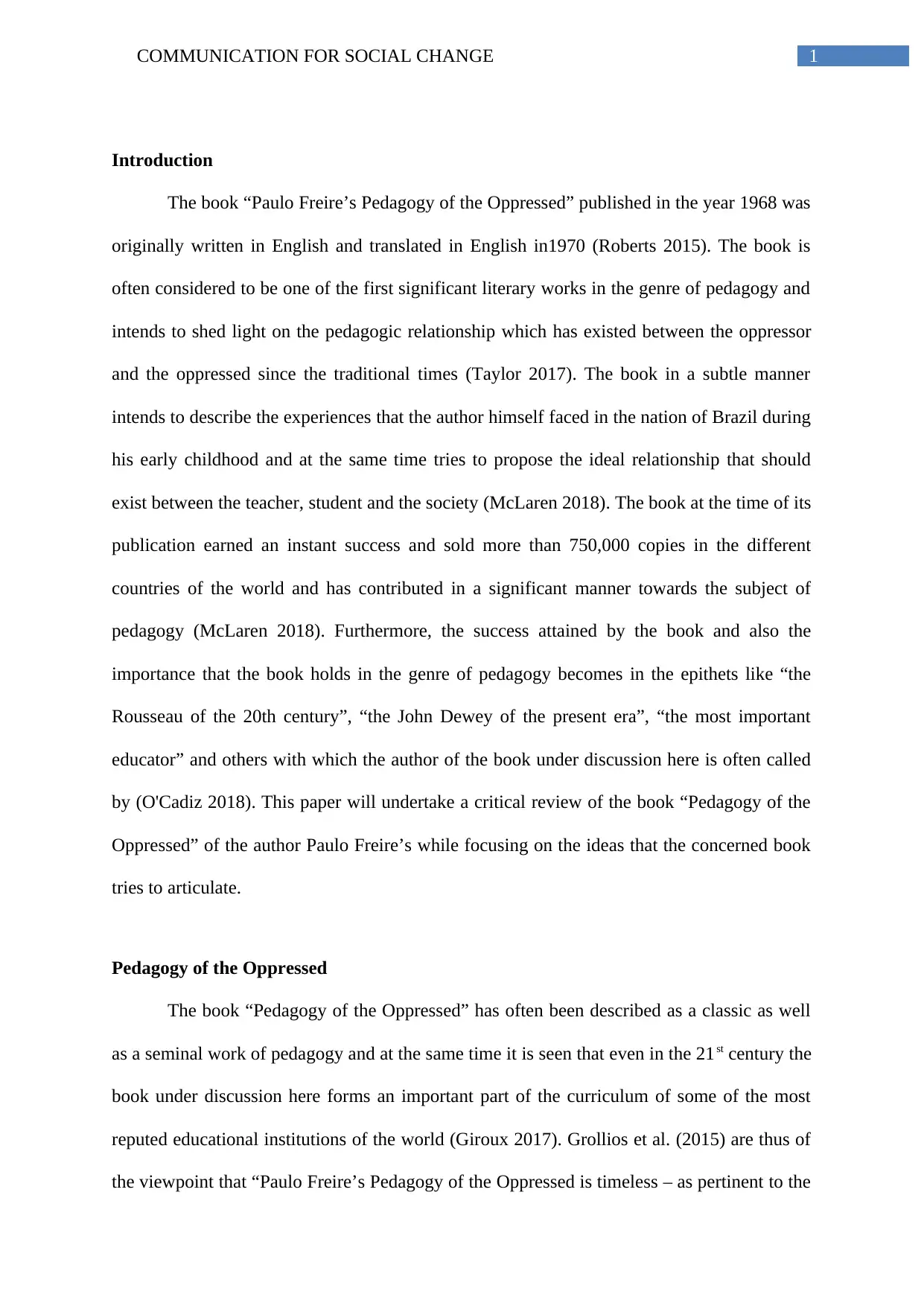
1COMMUNICATION FOR SOCIAL CHANGE
Introduction
The book “Paulo Freire’s Pedagogy of the Oppressed” published in the year 1968 was
originally written in English and translated in English in1970 (Roberts 2015). The book is
often considered to be one of the first significant literary works in the genre of pedagogy and
intends to shed light on the pedagogic relationship which has existed between the oppressor
and the oppressed since the traditional times (Taylor 2017). The book in a subtle manner
intends to describe the experiences that the author himself faced in the nation of Brazil during
his early childhood and at the same time tries to propose the ideal relationship that should
exist between the teacher, student and the society (McLaren 2018). The book at the time of its
publication earned an instant success and sold more than 750,000 copies in the different
countries of the world and has contributed in a significant manner towards the subject of
pedagogy (McLaren 2018). Furthermore, the success attained by the book and also the
importance that the book holds in the genre of pedagogy becomes in the epithets like “the
Rousseau of the 20th century”, “the John Dewey of the present era”, “the most important
educator” and others with which the author of the book under discussion here is often called
by (O'Cadiz 2018). This paper will undertake a critical review of the book “Pedagogy of the
Oppressed” of the author Paulo Freire’s while focusing on the ideas that the concerned book
tries to articulate.
Pedagogy of the Oppressed
The book “Pedagogy of the Oppressed” has often been described as a classic as well
as a seminal work of pedagogy and at the same time it is seen that even in the 21st century the
book under discussion here forms an important part of the curriculum of some of the most
reputed educational institutions of the world (Giroux 2017). Grollios et al. (2015) are thus of
the viewpoint that “Paulo Freire’s Pedagogy of the Oppressed is timeless – as pertinent to the
Introduction
The book “Paulo Freire’s Pedagogy of the Oppressed” published in the year 1968 was
originally written in English and translated in English in1970 (Roberts 2015). The book is
often considered to be one of the first significant literary works in the genre of pedagogy and
intends to shed light on the pedagogic relationship which has existed between the oppressor
and the oppressed since the traditional times (Taylor 2017). The book in a subtle manner
intends to describe the experiences that the author himself faced in the nation of Brazil during
his early childhood and at the same time tries to propose the ideal relationship that should
exist between the teacher, student and the society (McLaren 2018). The book at the time of its
publication earned an instant success and sold more than 750,000 copies in the different
countries of the world and has contributed in a significant manner towards the subject of
pedagogy (McLaren 2018). Furthermore, the success attained by the book and also the
importance that the book holds in the genre of pedagogy becomes in the epithets like “the
Rousseau of the 20th century”, “the John Dewey of the present era”, “the most important
educator” and others with which the author of the book under discussion here is often called
by (O'Cadiz 2018). This paper will undertake a critical review of the book “Pedagogy of the
Oppressed” of the author Paulo Freire’s while focusing on the ideas that the concerned book
tries to articulate.
Pedagogy of the Oppressed
The book “Pedagogy of the Oppressed” has often been described as a classic as well
as a seminal work of pedagogy and at the same time it is seen that even in the 21st century the
book under discussion here forms an important part of the curriculum of some of the most
reputed educational institutions of the world (Giroux 2017). Grollios et al. (2015) are thus of
the viewpoint that “Paulo Freire’s Pedagogy of the Oppressed is timeless – as pertinent to the
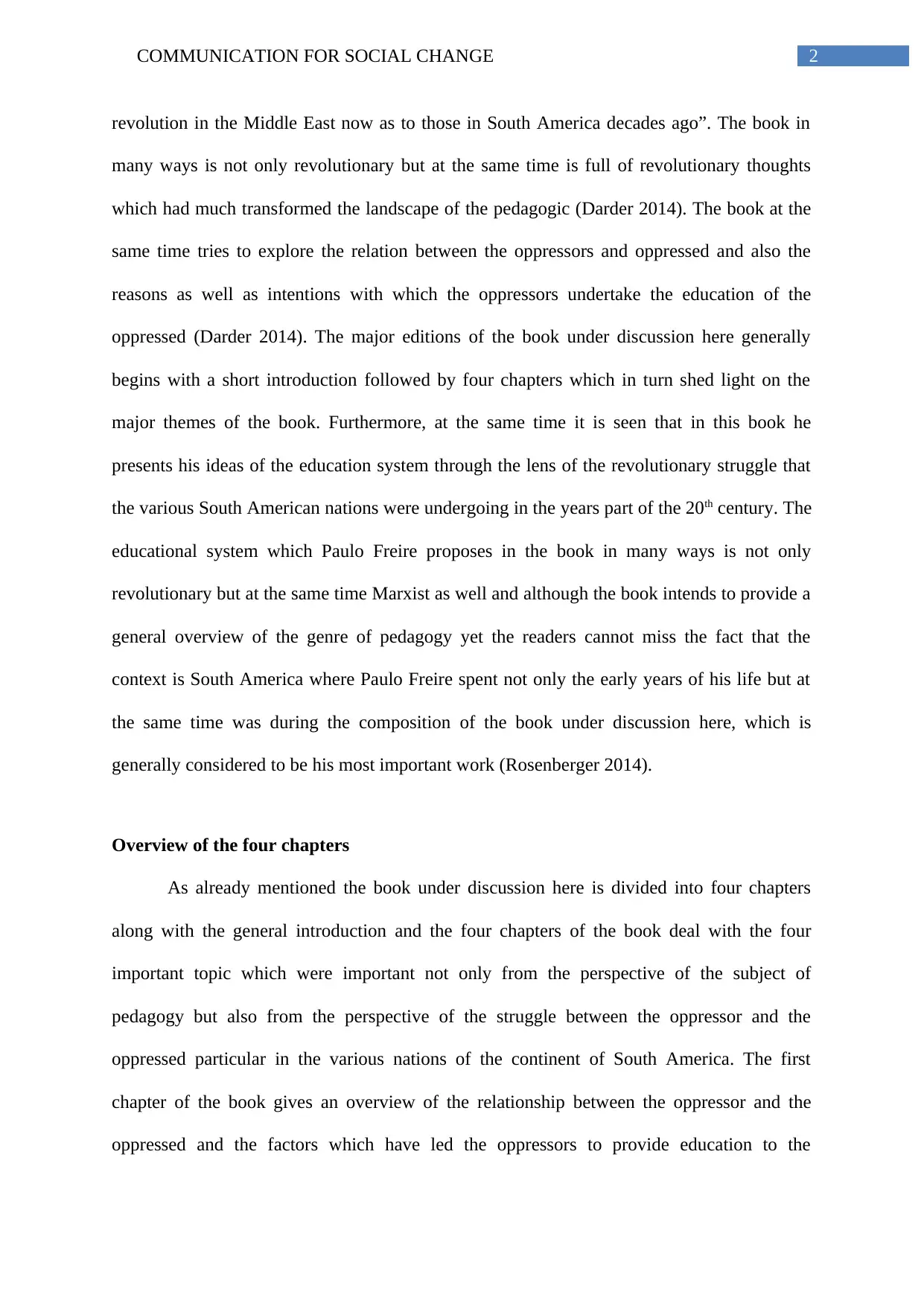
2COMMUNICATION FOR SOCIAL CHANGE
revolution in the Middle East now as to those in South America decades ago”. The book in
many ways is not only revolutionary but at the same time is full of revolutionary thoughts
which had much transformed the landscape of the pedagogic (Darder 2014). The book at the
same time tries to explore the relation between the oppressors and oppressed and also the
reasons as well as intentions with which the oppressors undertake the education of the
oppressed (Darder 2014). The major editions of the book under discussion here generally
begins with a short introduction followed by four chapters which in turn shed light on the
major themes of the book. Furthermore, at the same time it is seen that in this book he
presents his ideas of the education system through the lens of the revolutionary struggle that
the various South American nations were undergoing in the years part of the 20th century. The
educational system which Paulo Freire proposes in the book in many ways is not only
revolutionary but at the same time Marxist as well and although the book intends to provide a
general overview of the genre of pedagogy yet the readers cannot miss the fact that the
context is South America where Paulo Freire spent not only the early years of his life but at
the same time was during the composition of the book under discussion here, which is
generally considered to be his most important work (Rosenberger 2014).
Overview of the four chapters
As already mentioned the book under discussion here is divided into four chapters
along with the general introduction and the four chapters of the book deal with the four
important topic which were important not only from the perspective of the subject of
pedagogy but also from the perspective of the struggle between the oppressor and the
oppressed particular in the various nations of the continent of South America. The first
chapter of the book gives an overview of the relationship between the oppressor and the
oppressed and the factors which have led the oppressors to provide education to the
revolution in the Middle East now as to those in South America decades ago”. The book in
many ways is not only revolutionary but at the same time is full of revolutionary thoughts
which had much transformed the landscape of the pedagogic (Darder 2014). The book at the
same time tries to explore the relation between the oppressors and oppressed and also the
reasons as well as intentions with which the oppressors undertake the education of the
oppressed (Darder 2014). The major editions of the book under discussion here generally
begins with a short introduction followed by four chapters which in turn shed light on the
major themes of the book. Furthermore, at the same time it is seen that in this book he
presents his ideas of the education system through the lens of the revolutionary struggle that
the various South American nations were undergoing in the years part of the 20th century. The
educational system which Paulo Freire proposes in the book in many ways is not only
revolutionary but at the same time Marxist as well and although the book intends to provide a
general overview of the genre of pedagogy yet the readers cannot miss the fact that the
context is South America where Paulo Freire spent not only the early years of his life but at
the same time was during the composition of the book under discussion here, which is
generally considered to be his most important work (Rosenberger 2014).
Overview of the four chapters
As already mentioned the book under discussion here is divided into four chapters
along with the general introduction and the four chapters of the book deal with the four
important topic which were important not only from the perspective of the subject of
pedagogy but also from the perspective of the struggle between the oppressor and the
oppressed particular in the various nations of the continent of South America. The first
chapter of the book gives an overview of the relationship between the oppressor and the
oppressed and the factors which have led the oppressors to provide education to the
⊘ This is a preview!⊘
Do you want full access?
Subscribe today to unlock all pages.

Trusted by 1+ million students worldwide
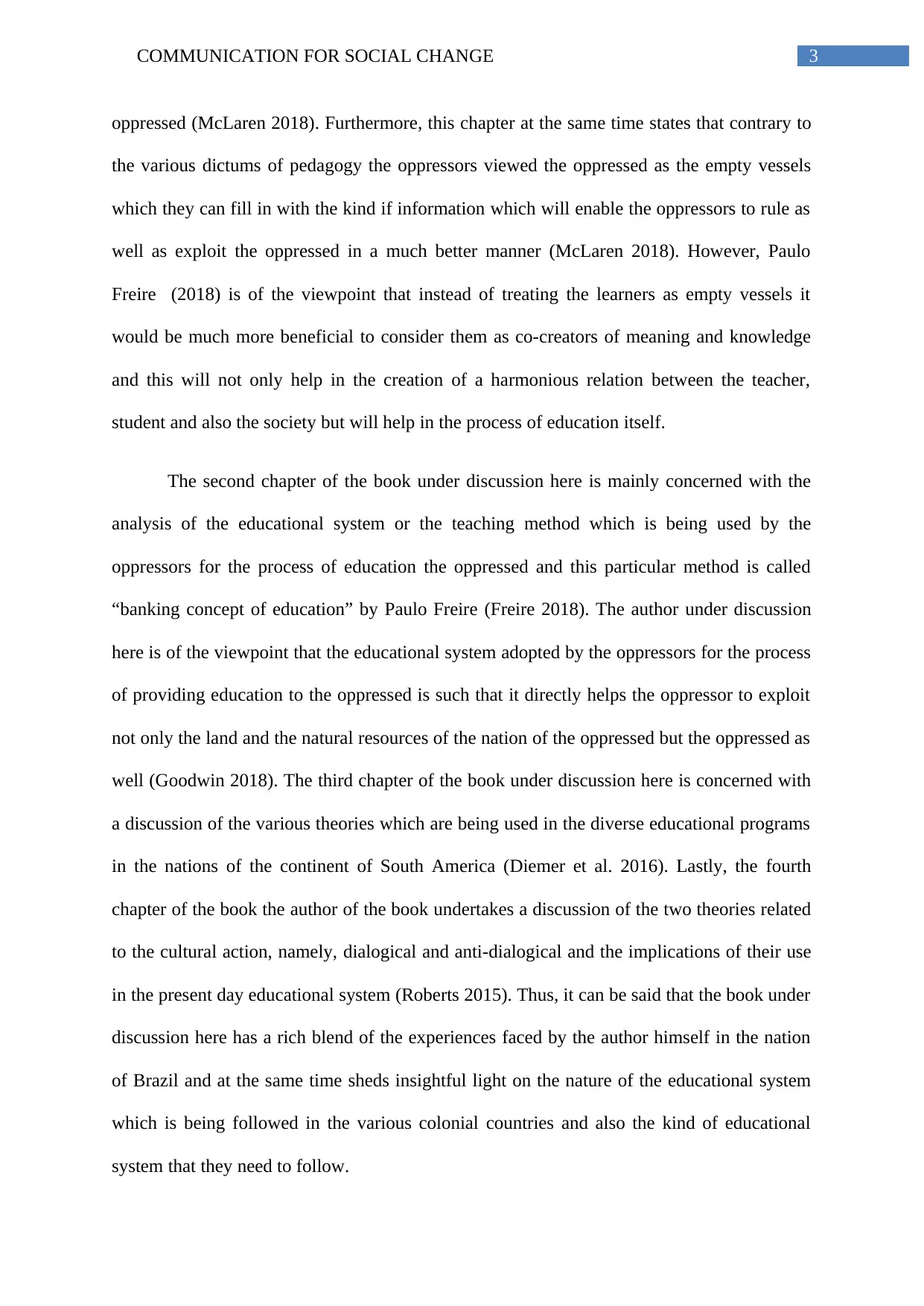
3COMMUNICATION FOR SOCIAL CHANGE
oppressed (McLaren 2018). Furthermore, this chapter at the same time states that contrary to
the various dictums of pedagogy the oppressors viewed the oppressed as the empty vessels
which they can fill in with the kind if information which will enable the oppressors to rule as
well as exploit the oppressed in a much better manner (McLaren 2018). However, Paulo
Freire (2018) is of the viewpoint that instead of treating the learners as empty vessels it
would be much more beneficial to consider them as co-creators of meaning and knowledge
and this will not only help in the creation of a harmonious relation between the teacher,
student and also the society but will help in the process of education itself.
The second chapter of the book under discussion here is mainly concerned with the
analysis of the educational system or the teaching method which is being used by the
oppressors for the process of education the oppressed and this particular method is called
“banking concept of education” by Paulo Freire (Freire 2018). The author under discussion
here is of the viewpoint that the educational system adopted by the oppressors for the process
of providing education to the oppressed is such that it directly helps the oppressor to exploit
not only the land and the natural resources of the nation of the oppressed but the oppressed as
well (Goodwin 2018). The third chapter of the book under discussion here is concerned with
a discussion of the various theories which are being used in the diverse educational programs
in the nations of the continent of South America (Diemer et al. 2016). Lastly, the fourth
chapter of the book the author of the book undertakes a discussion of the two theories related
to the cultural action, namely, dialogical and anti-dialogical and the implications of their use
in the present day educational system (Roberts 2015). Thus, it can be said that the book under
discussion here has a rich blend of the experiences faced by the author himself in the nation
of Brazil and at the same time sheds insightful light on the nature of the educational system
which is being followed in the various colonial countries and also the kind of educational
system that they need to follow.
oppressed (McLaren 2018). Furthermore, this chapter at the same time states that contrary to
the various dictums of pedagogy the oppressors viewed the oppressed as the empty vessels
which they can fill in with the kind if information which will enable the oppressors to rule as
well as exploit the oppressed in a much better manner (McLaren 2018). However, Paulo
Freire (2018) is of the viewpoint that instead of treating the learners as empty vessels it
would be much more beneficial to consider them as co-creators of meaning and knowledge
and this will not only help in the creation of a harmonious relation between the teacher,
student and also the society but will help in the process of education itself.
The second chapter of the book under discussion here is mainly concerned with the
analysis of the educational system or the teaching method which is being used by the
oppressors for the process of education the oppressed and this particular method is called
“banking concept of education” by Paulo Freire (Freire 2018). The author under discussion
here is of the viewpoint that the educational system adopted by the oppressors for the process
of providing education to the oppressed is such that it directly helps the oppressor to exploit
not only the land and the natural resources of the nation of the oppressed but the oppressed as
well (Goodwin 2018). The third chapter of the book under discussion here is concerned with
a discussion of the various theories which are being used in the diverse educational programs
in the nations of the continent of South America (Diemer et al. 2016). Lastly, the fourth
chapter of the book the author of the book undertakes a discussion of the two theories related
to the cultural action, namely, dialogical and anti-dialogical and the implications of their use
in the present day educational system (Roberts 2015). Thus, it can be said that the book under
discussion here has a rich blend of the experiences faced by the author himself in the nation
of Brazil and at the same time sheds insightful light on the nature of the educational system
which is being followed in the various colonial countries and also the kind of educational
system that they need to follow.
Paraphrase This Document
Need a fresh take? Get an instant paraphrase of this document with our AI Paraphraser
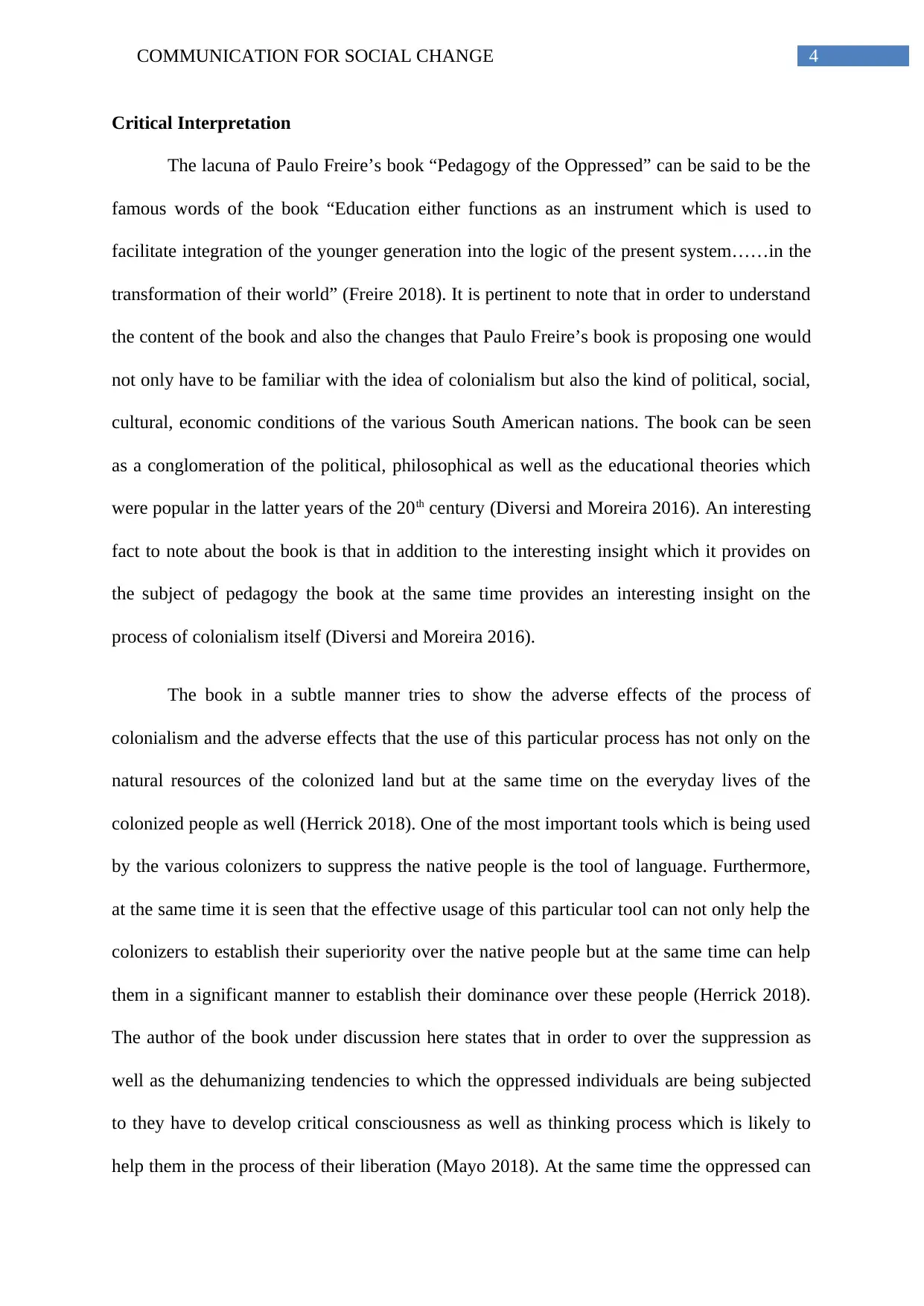
4COMMUNICATION FOR SOCIAL CHANGE
Critical Interpretation
The lacuna of Paulo Freire’s book “Pedagogy of the Oppressed” can be said to be the
famous words of the book “Education either functions as an instrument which is used to
facilitate integration of the younger generation into the logic of the present system……in the
transformation of their world” (Freire 2018). It is pertinent to note that in order to understand
the content of the book and also the changes that Paulo Freire’s book is proposing one would
not only have to be familiar with the idea of colonialism but also the kind of political, social,
cultural, economic conditions of the various South American nations. The book can be seen
as a conglomeration of the political, philosophical as well as the educational theories which
were popular in the latter years of the 20th century (Diversi and Moreira 2016). An interesting
fact to note about the book is that in addition to the interesting insight which it provides on
the subject of pedagogy the book at the same time provides an interesting insight on the
process of colonialism itself (Diversi and Moreira 2016).
The book in a subtle manner tries to show the adverse effects of the process of
colonialism and the adverse effects that the use of this particular process has not only on the
natural resources of the colonized land but at the same time on the everyday lives of the
colonized people as well (Herrick 2018). One of the most important tools which is being used
by the various colonizers to suppress the native people is the tool of language. Furthermore,
at the same time it is seen that the effective usage of this particular tool can not only help the
colonizers to establish their superiority over the native people but at the same time can help
them in a significant manner to establish their dominance over these people (Herrick 2018).
The author of the book under discussion here states that in order to over the suppression as
well as the dehumanizing tendencies to which the oppressed individuals are being subjected
to they have to develop critical consciousness as well as thinking process which is likely to
help them in the process of their liberation (Mayo 2018). At the same time the oppressed can
Critical Interpretation
The lacuna of Paulo Freire’s book “Pedagogy of the Oppressed” can be said to be the
famous words of the book “Education either functions as an instrument which is used to
facilitate integration of the younger generation into the logic of the present system……in the
transformation of their world” (Freire 2018). It is pertinent to note that in order to understand
the content of the book and also the changes that Paulo Freire’s book is proposing one would
not only have to be familiar with the idea of colonialism but also the kind of political, social,
cultural, economic conditions of the various South American nations. The book can be seen
as a conglomeration of the political, philosophical as well as the educational theories which
were popular in the latter years of the 20th century (Diversi and Moreira 2016). An interesting
fact to note about the book is that in addition to the interesting insight which it provides on
the subject of pedagogy the book at the same time provides an interesting insight on the
process of colonialism itself (Diversi and Moreira 2016).
The book in a subtle manner tries to show the adverse effects of the process of
colonialism and the adverse effects that the use of this particular process has not only on the
natural resources of the colonized land but at the same time on the everyday lives of the
colonized people as well (Herrick 2018). One of the most important tools which is being used
by the various colonizers to suppress the native people is the tool of language. Furthermore,
at the same time it is seen that the effective usage of this particular tool can not only help the
colonizers to establish their superiority over the native people but at the same time can help
them in a significant manner to establish their dominance over these people (Herrick 2018).
The author of the book under discussion here states that in order to over the suppression as
well as the dehumanizing tendencies to which the oppressed individuals are being subjected
to they have to develop critical consciousness as well as thinking process which is likely to
help them in the process of their liberation (Mayo 2018). At the same time the oppressed can
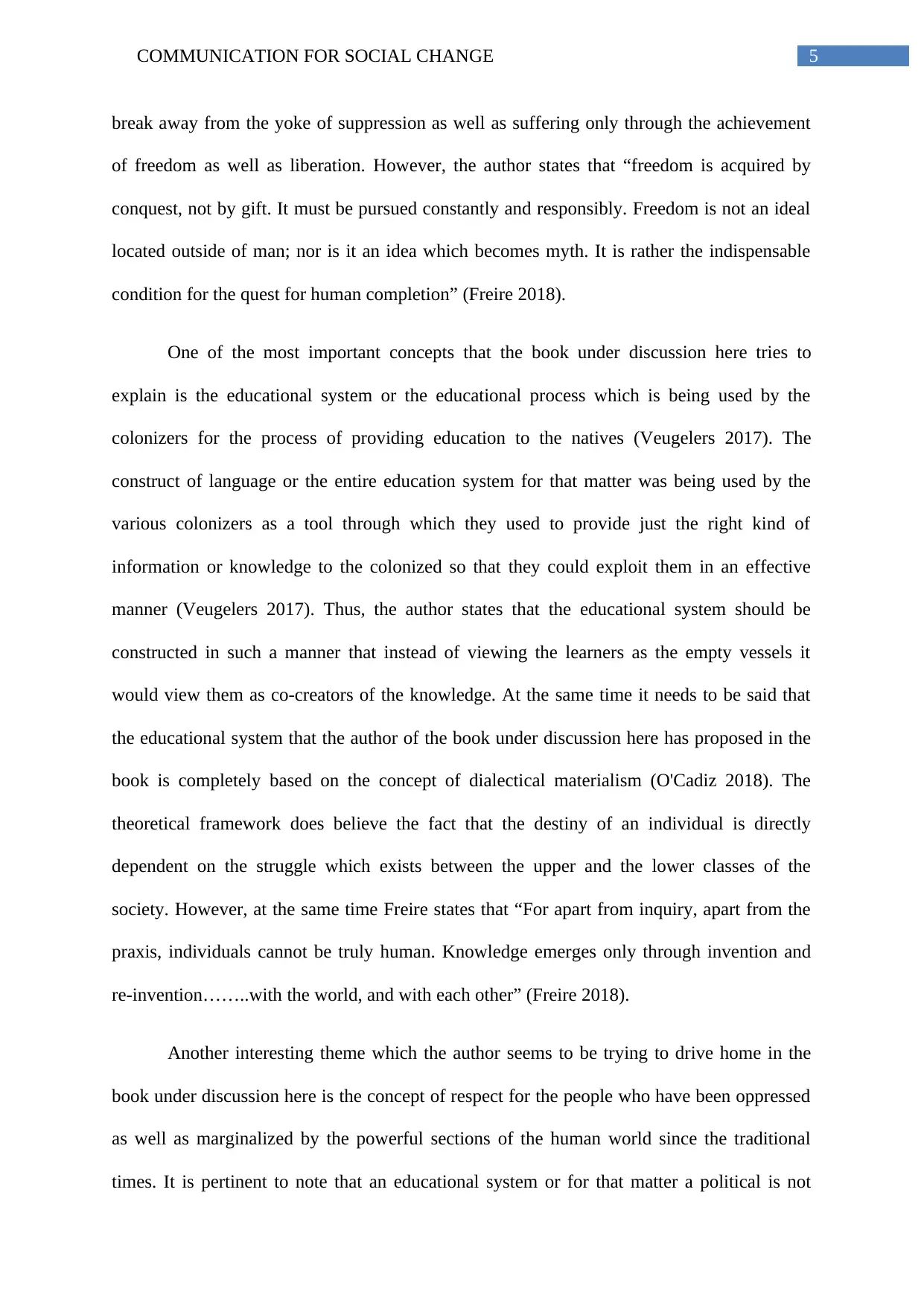
5COMMUNICATION FOR SOCIAL CHANGE
break away from the yoke of suppression as well as suffering only through the achievement
of freedom as well as liberation. However, the author states that “freedom is acquired by
conquest, not by gift. It must be pursued constantly and responsibly. Freedom is not an ideal
located outside of man; nor is it an idea which becomes myth. It is rather the indispensable
condition for the quest for human completion” (Freire 2018).
One of the most important concepts that the book under discussion here tries to
explain is the educational system or the educational process which is being used by the
colonizers for the process of providing education to the natives (Veugelers 2017). The
construct of language or the entire education system for that matter was being used by the
various colonizers as a tool through which they used to provide just the right kind of
information or knowledge to the colonized so that they could exploit them in an effective
manner (Veugelers 2017). Thus, the author states that the educational system should be
constructed in such a manner that instead of viewing the learners as the empty vessels it
would view them as co-creators of the knowledge. At the same time it needs to be said that
the educational system that the author of the book under discussion here has proposed in the
book is completely based on the concept of dialectical materialism (O'Cadiz 2018). The
theoretical framework does believe the fact that the destiny of an individual is directly
dependent on the struggle which exists between the upper and the lower classes of the
society. However, at the same time Freire states that “For apart from inquiry, apart from the
praxis, individuals cannot be truly human. Knowledge emerges only through invention and
re-invention……..with the world, and with each other” (Freire 2018).
Another interesting theme which the author seems to be trying to drive home in the
book under discussion here is the concept of respect for the people who have been oppressed
as well as marginalized by the powerful sections of the human world since the traditional
times. It is pertinent to note that an educational system or for that matter a political is not
break away from the yoke of suppression as well as suffering only through the achievement
of freedom as well as liberation. However, the author states that “freedom is acquired by
conquest, not by gift. It must be pursued constantly and responsibly. Freedom is not an ideal
located outside of man; nor is it an idea which becomes myth. It is rather the indispensable
condition for the quest for human completion” (Freire 2018).
One of the most important concepts that the book under discussion here tries to
explain is the educational system or the educational process which is being used by the
colonizers for the process of providing education to the natives (Veugelers 2017). The
construct of language or the entire education system for that matter was being used by the
various colonizers as a tool through which they used to provide just the right kind of
information or knowledge to the colonized so that they could exploit them in an effective
manner (Veugelers 2017). Thus, the author states that the educational system should be
constructed in such a manner that instead of viewing the learners as the empty vessels it
would view them as co-creators of the knowledge. At the same time it needs to be said that
the educational system that the author of the book under discussion here has proposed in the
book is completely based on the concept of dialectical materialism (O'Cadiz 2018). The
theoretical framework does believe the fact that the destiny of an individual is directly
dependent on the struggle which exists between the upper and the lower classes of the
society. However, at the same time Freire states that “For apart from inquiry, apart from the
praxis, individuals cannot be truly human. Knowledge emerges only through invention and
re-invention……..with the world, and with each other” (Freire 2018).
Another interesting theme which the author seems to be trying to drive home in the
book under discussion here is the concept of respect for the people who have been oppressed
as well as marginalized by the powerful sections of the human world since the traditional
times. It is pertinent to note that an educational system or for that matter a political is not
⊘ This is a preview!⊘
Do you want full access?
Subscribe today to unlock all pages.

Trusted by 1+ million students worldwide
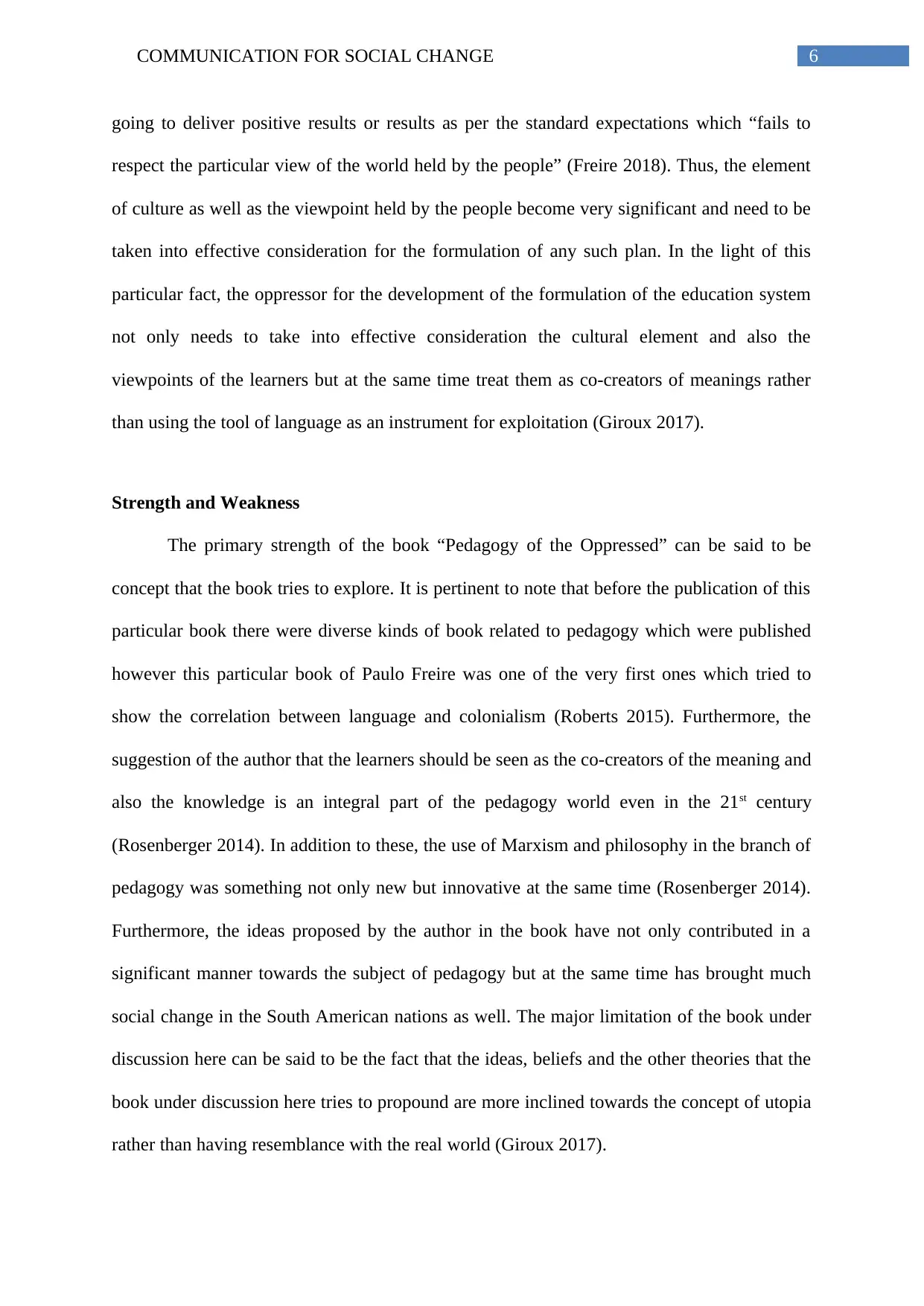
6COMMUNICATION FOR SOCIAL CHANGE
going to deliver positive results or results as per the standard expectations which “fails to
respect the particular view of the world held by the people” (Freire 2018). Thus, the element
of culture as well as the viewpoint held by the people become very significant and need to be
taken into effective consideration for the formulation of any such plan. In the light of this
particular fact, the oppressor for the development of the formulation of the education system
not only needs to take into effective consideration the cultural element and also the
viewpoints of the learners but at the same time treat them as co-creators of meanings rather
than using the tool of language as an instrument for exploitation (Giroux 2017).
Strength and Weakness
The primary strength of the book “Pedagogy of the Oppressed” can be said to be
concept that the book tries to explore. It is pertinent to note that before the publication of this
particular book there were diverse kinds of book related to pedagogy which were published
however this particular book of Paulo Freire was one of the very first ones which tried to
show the correlation between language and colonialism (Roberts 2015). Furthermore, the
suggestion of the author that the learners should be seen as the co-creators of the meaning and
also the knowledge is an integral part of the pedagogy world even in the 21st century
(Rosenberger 2014). In addition to these, the use of Marxism and philosophy in the branch of
pedagogy was something not only new but innovative at the same time (Rosenberger 2014).
Furthermore, the ideas proposed by the author in the book have not only contributed in a
significant manner towards the subject of pedagogy but at the same time has brought much
social change in the South American nations as well. The major limitation of the book under
discussion here can be said to be the fact that the ideas, beliefs and the other theories that the
book under discussion here tries to propound are more inclined towards the concept of utopia
rather than having resemblance with the real world (Giroux 2017).
going to deliver positive results or results as per the standard expectations which “fails to
respect the particular view of the world held by the people” (Freire 2018). Thus, the element
of culture as well as the viewpoint held by the people become very significant and need to be
taken into effective consideration for the formulation of any such plan. In the light of this
particular fact, the oppressor for the development of the formulation of the education system
not only needs to take into effective consideration the cultural element and also the
viewpoints of the learners but at the same time treat them as co-creators of meanings rather
than using the tool of language as an instrument for exploitation (Giroux 2017).
Strength and Weakness
The primary strength of the book “Pedagogy of the Oppressed” can be said to be
concept that the book tries to explore. It is pertinent to note that before the publication of this
particular book there were diverse kinds of book related to pedagogy which were published
however this particular book of Paulo Freire was one of the very first ones which tried to
show the correlation between language and colonialism (Roberts 2015). Furthermore, the
suggestion of the author that the learners should be seen as the co-creators of the meaning and
also the knowledge is an integral part of the pedagogy world even in the 21st century
(Rosenberger 2014). In addition to these, the use of Marxism and philosophy in the branch of
pedagogy was something not only new but innovative at the same time (Rosenberger 2014).
Furthermore, the ideas proposed by the author in the book have not only contributed in a
significant manner towards the subject of pedagogy but at the same time has brought much
social change in the South American nations as well. The major limitation of the book under
discussion here can be said to be the fact that the ideas, beliefs and the other theories that the
book under discussion here tries to propound are more inclined towards the concept of utopia
rather than having resemblance with the real world (Giroux 2017).
Paraphrase This Document
Need a fresh take? Get an instant paraphrase of this document with our AI Paraphraser
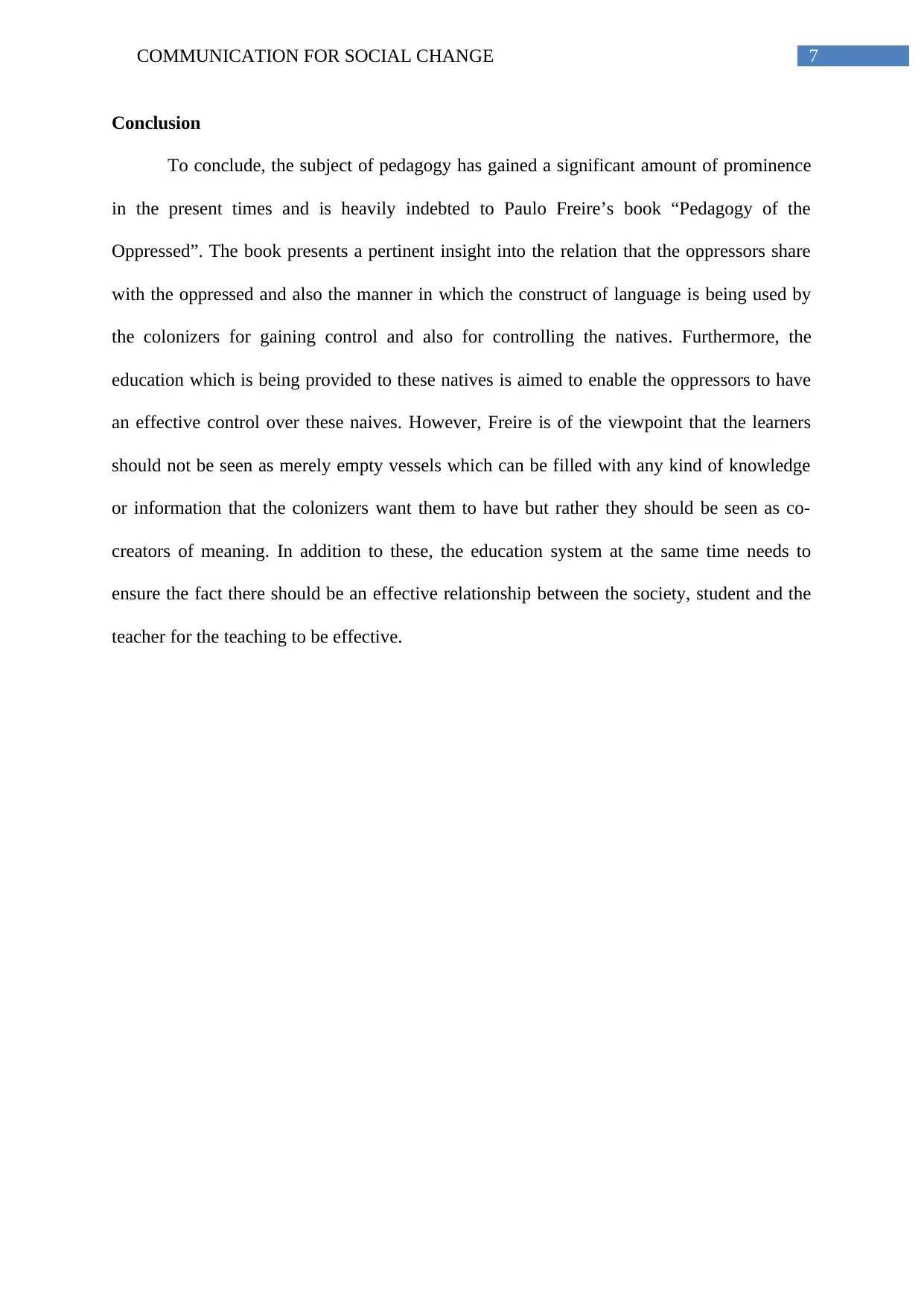
7COMMUNICATION FOR SOCIAL CHANGE
Conclusion
To conclude, the subject of pedagogy has gained a significant amount of prominence
in the present times and is heavily indebted to Paulo Freire’s book “Pedagogy of the
Oppressed”. The book presents a pertinent insight into the relation that the oppressors share
with the oppressed and also the manner in which the construct of language is being used by
the colonizers for gaining control and also for controlling the natives. Furthermore, the
education which is being provided to these natives is aimed to enable the oppressors to have
an effective control over these naives. However, Freire is of the viewpoint that the learners
should not be seen as merely empty vessels which can be filled with any kind of knowledge
or information that the colonizers want them to have but rather they should be seen as co-
creators of meaning. In addition to these, the education system at the same time needs to
ensure the fact there should be an effective relationship between the society, student and the
teacher for the teaching to be effective.
Conclusion
To conclude, the subject of pedagogy has gained a significant amount of prominence
in the present times and is heavily indebted to Paulo Freire’s book “Pedagogy of the
Oppressed”. The book presents a pertinent insight into the relation that the oppressors share
with the oppressed and also the manner in which the construct of language is being used by
the colonizers for gaining control and also for controlling the natives. Furthermore, the
education which is being provided to these natives is aimed to enable the oppressors to have
an effective control over these naives. However, Freire is of the viewpoint that the learners
should not be seen as merely empty vessels which can be filled with any kind of knowledge
or information that the colonizers want them to have but rather they should be seen as co-
creators of meaning. In addition to these, the education system at the same time needs to
ensure the fact there should be an effective relationship between the society, student and the
teacher for the teaching to be effective.
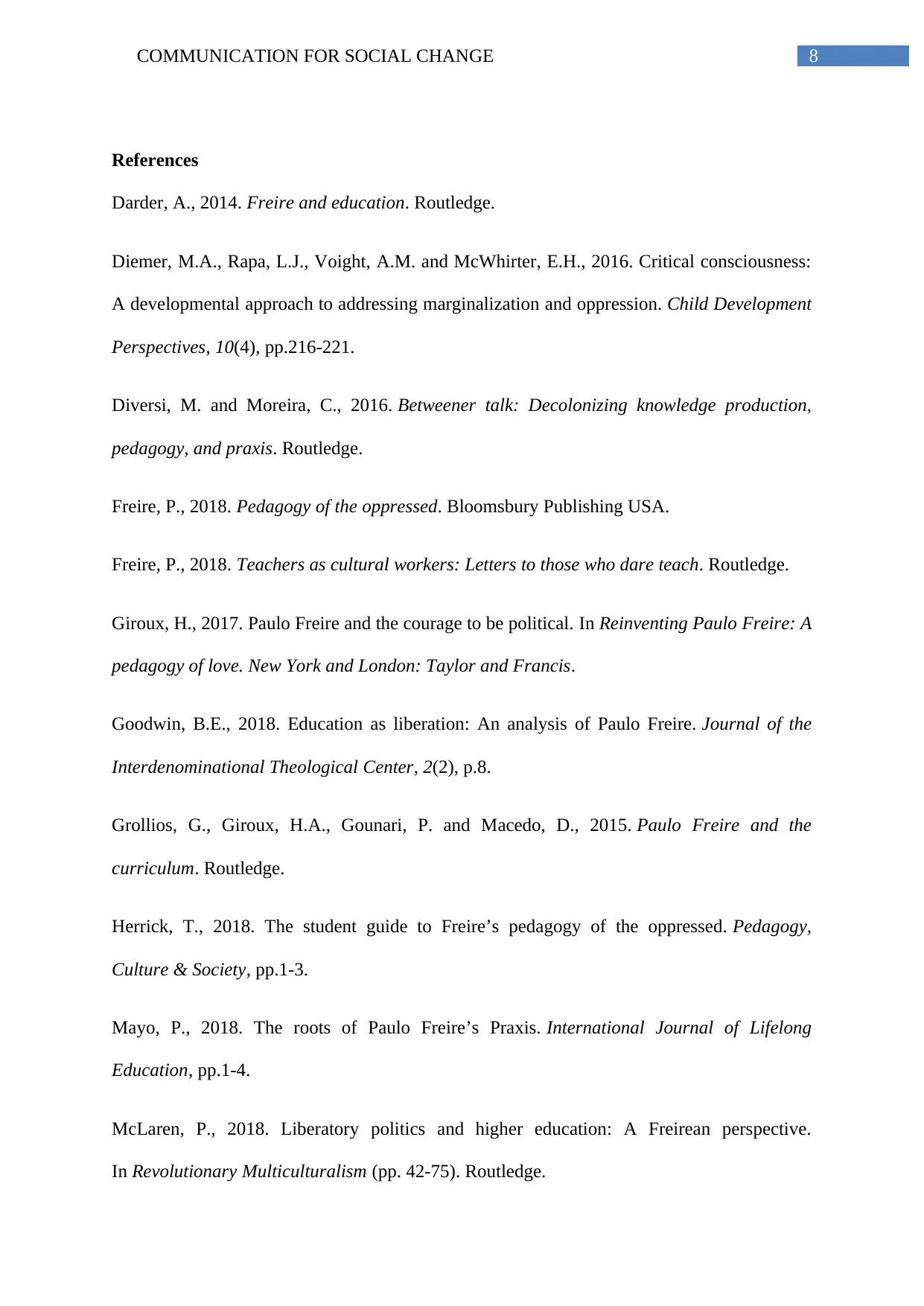
8COMMUNICATION FOR SOCIAL CHANGE
References
Darder, A., 2014. Freire and education. Routledge.
Diemer, M.A., Rapa, L.J., Voight, A.M. and McWhirter, E.H., 2016. Critical consciousness:
A developmental approach to addressing marginalization and oppression. Child Development
Perspectives, 10(4), pp.216-221.
Diversi, M. and Moreira, C., 2016. Betweener talk: Decolonizing knowledge production,
pedagogy, and praxis. Routledge.
Freire, P., 2018. Pedagogy of the oppressed. Bloomsbury Publishing USA.
Freire, P., 2018. Teachers as cultural workers: Letters to those who dare teach. Routledge.
Giroux, H., 2017. Paulo Freire and the courage to be political. In Reinventing Paulo Freire: A
pedagogy of love. New York and London: Taylor and Francis.
Goodwin, B.E., 2018. Education as liberation: An analysis of Paulo Freire. Journal of the
Interdenominational Theological Center, 2(2), p.8.
Grollios, G., Giroux, H.A., Gounari, P. and Macedo, D., 2015. Paulo Freire and the
curriculum. Routledge.
Herrick, T., 2018. The student guide to Freire’s pedagogy of the oppressed. Pedagogy,
Culture & Society, pp.1-3.
Mayo, P., 2018. The roots of Paulo Freire’s Praxis. International Journal of Lifelong
Education, pp.1-4.
McLaren, P., 2018. Liberatory politics and higher education: A Freirean perspective.
In Revolutionary Multiculturalism (pp. 42-75). Routledge.
References
Darder, A., 2014. Freire and education. Routledge.
Diemer, M.A., Rapa, L.J., Voight, A.M. and McWhirter, E.H., 2016. Critical consciousness:
A developmental approach to addressing marginalization and oppression. Child Development
Perspectives, 10(4), pp.216-221.
Diversi, M. and Moreira, C., 2016. Betweener talk: Decolonizing knowledge production,
pedagogy, and praxis. Routledge.
Freire, P., 2018. Pedagogy of the oppressed. Bloomsbury Publishing USA.
Freire, P., 2018. Teachers as cultural workers: Letters to those who dare teach. Routledge.
Giroux, H., 2017. Paulo Freire and the courage to be political. In Reinventing Paulo Freire: A
pedagogy of love. New York and London: Taylor and Francis.
Goodwin, B.E., 2018. Education as liberation: An analysis of Paulo Freire. Journal of the
Interdenominational Theological Center, 2(2), p.8.
Grollios, G., Giroux, H.A., Gounari, P. and Macedo, D., 2015. Paulo Freire and the
curriculum. Routledge.
Herrick, T., 2018. The student guide to Freire’s pedagogy of the oppressed. Pedagogy,
Culture & Society, pp.1-3.
Mayo, P., 2018. The roots of Paulo Freire’s Praxis. International Journal of Lifelong
Education, pp.1-4.
McLaren, P., 2018. Liberatory politics and higher education: A Freirean perspective.
In Revolutionary Multiculturalism (pp. 42-75). Routledge.
⊘ This is a preview!⊘
Do you want full access?
Subscribe today to unlock all pages.

Trusted by 1+ million students worldwide
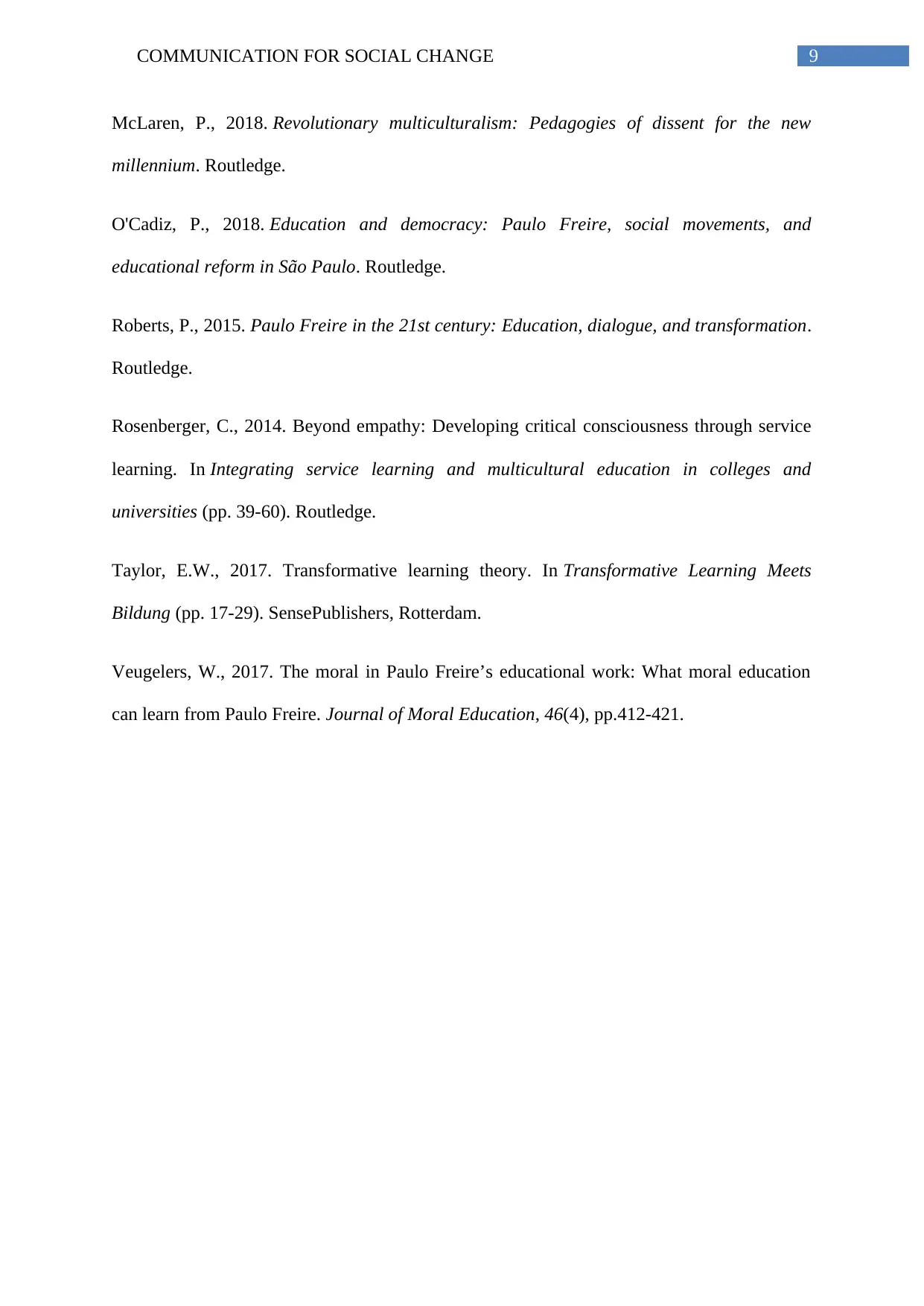
9COMMUNICATION FOR SOCIAL CHANGE
McLaren, P., 2018. Revolutionary multiculturalism: Pedagogies of dissent for the new
millennium. Routledge.
O'Cadiz, P., 2018. Education and democracy: Paulo Freire, social movements, and
educational reform in São Paulo. Routledge.
Roberts, P., 2015. Paulo Freire in the 21st century: Education, dialogue, and transformation.
Routledge.
Rosenberger, C., 2014. Beyond empathy: Developing critical consciousness through service
learning. In Integrating service learning and multicultural education in colleges and
universities (pp. 39-60). Routledge.
Taylor, E.W., 2017. Transformative learning theory. In Transformative Learning Meets
Bildung (pp. 17-29). SensePublishers, Rotterdam.
Veugelers, W., 2017. The moral in Paulo Freire’s educational work: What moral education
can learn from Paulo Freire. Journal of Moral Education, 46(4), pp.412-421.
McLaren, P., 2018. Revolutionary multiculturalism: Pedagogies of dissent for the new
millennium. Routledge.
O'Cadiz, P., 2018. Education and democracy: Paulo Freire, social movements, and
educational reform in São Paulo. Routledge.
Roberts, P., 2015. Paulo Freire in the 21st century: Education, dialogue, and transformation.
Routledge.
Rosenberger, C., 2014. Beyond empathy: Developing critical consciousness through service
learning. In Integrating service learning and multicultural education in colleges and
universities (pp. 39-60). Routledge.
Taylor, E.W., 2017. Transformative learning theory. In Transformative Learning Meets
Bildung (pp. 17-29). SensePublishers, Rotterdam.
Veugelers, W., 2017. The moral in Paulo Freire’s educational work: What moral education
can learn from Paulo Freire. Journal of Moral Education, 46(4), pp.412-421.
1 out of 10
Your All-in-One AI-Powered Toolkit for Academic Success.
+13062052269
info@desklib.com
Available 24*7 on WhatsApp / Email
![[object Object]](/_next/static/media/star-bottom.7253800d.svg)
Unlock your academic potential
Copyright © 2020–2026 A2Z Services. All Rights Reserved. Developed and managed by ZUCOL.


